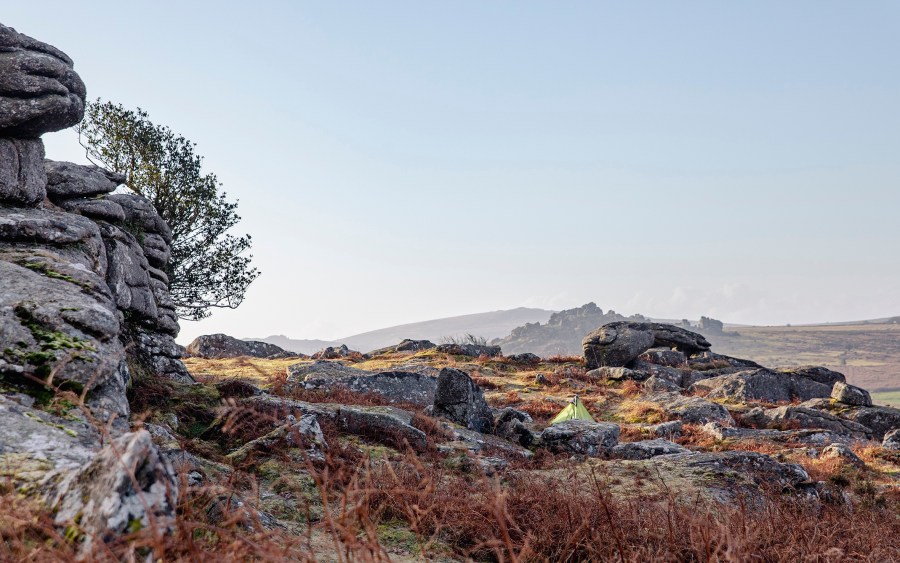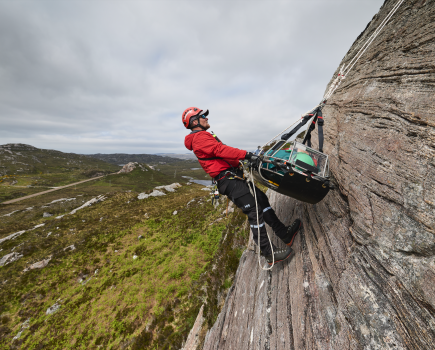In October 2024, the Supreme Court heard a case that could protect or extinguish the right to wild camp on Dartmoor. This is an issue that should concern everyone who loves the great outdoors.
We set up camp on the edge of a small mixed woodland, two miles from the ex-mining town of Rosewell in the Scottish Borders. We’d walked out from my friend Sam’s house in the afternoon, and by 6pm we were rigging our tarp and laying out sleeping mats. Up on the rise above, we watched the sun set over the Pentland Hills – the last of the day’s warmth a welcome comfort before the chill of the night.
Main image: A camp on Dartmoor | Credit: Fern Leigh Albert
While we’d previously set our sights on the Cairngorms or the more westerly summits of Glencoe, I’d asked Sam if we could set out from his front door for a local camp, not far from home. I’d asked this because I was intrigued: what’s it like to have a national right to roam, a foundation of access rights which extend to land and water, and which include the ability to sleep under the stars a short walk from your home?
This has always been customary in the Highlands, but here in the Central Belt of Scotland it is relatively new, resulting from the Land Reform Act passed in 2003, and supported by the Scottish Outdoor Access Code. To Sam it has become much more than a right – it’s something which is ingrained into his sense of self. “I need these moments”, he said. “It’s part of who I am. It’s a reset, but it’s also a way to connect with what matters.”
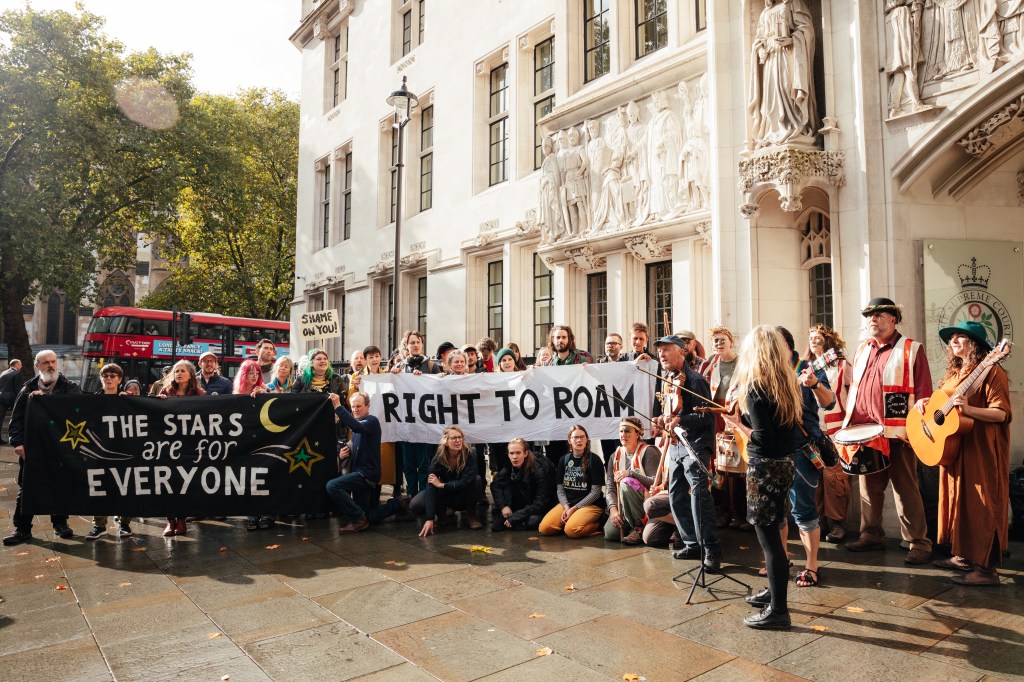
Outside the Supreme Court case that could protect or extinguish the right to wild camp on Dartmoor. Credit: Emma Stoner
I’d travelled up from Devon two days previous, and a broken-but-restful night in those woods offered ample perspective on the issues facing the place I call home. In England, the right to sleep under the stars is confined to just 0.2% of the country – about 70,000 acres in Dartmoor National Park. At the time of writing, even this is under threat from landowners with enough wealth to challenge it in court.
A legal case brought by Alexander and Diana Darwall – owners of the 4,000-acre Blachford Estate in Dartmoor – has been rumbling on for two years now, originally resulting in the loss of wild camping rights in early 2022. Although this was later overturned in the Court of Appeal, we’re currently waiting for the Supreme Court to rule on a final hearing which will determine whether wild camping is to remain a legal right within the national park.
Dartmoor’s unique access rights have offered people a gateway into experiences which are not legally available anywhere else in England – via Ten Tors or Duke of Edinburgh’s Award expeditions, or through camping on the moors with friends and family. Wild camping is a way in: into another mode of being – a slowness and stillness which softens the borders between human and nature. But it’s also a way out – out of the commotion of the everyday for those seeking solace, and a form of connection which doesn’t depend upon a phone signal.
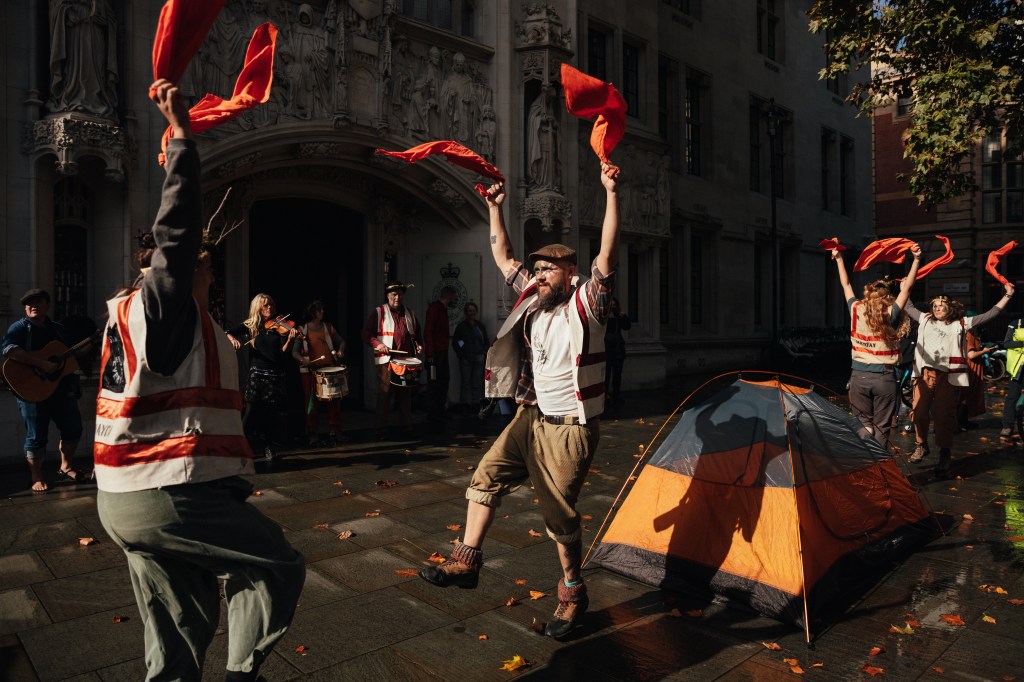
Thousands have gathered over the course a two-year-long campaign in peaceful protest. Credit: Emma Stoner
Over the course of the two years of campaigning to protect this right, we’ve heard from hundreds of people for whom nights under Dartmoor’s stars have been life-shaping and transformative. But until the Darwalls brought their case against wild camping in late 2021, such experiences remained almost unheard of by the wider public.
It’s a tragic reality that we can’t miss what we haven’t noticed, and we often won’t notice what we haven’t experienced. It was probably a safe bet then, on the Darwalls’ part, that wild camping was going to go quietly into the night. How they underestimated the public reaction: the original High Court ruling saw 3,500 people take to Stall Moor on the Blachford Estate in protest.
While wild camping is in court, the case has transmuted into an important illustration of both the value and the fragility of our access to nature in England, and has galvanised a mass awareness of our disconnection. Just 8% of the English countryside is publicly accessible; 3% of rivers have an uncontested right to swim; and now, on Dartmoor, the last remaining right to sleep under the stars is facing extinction.
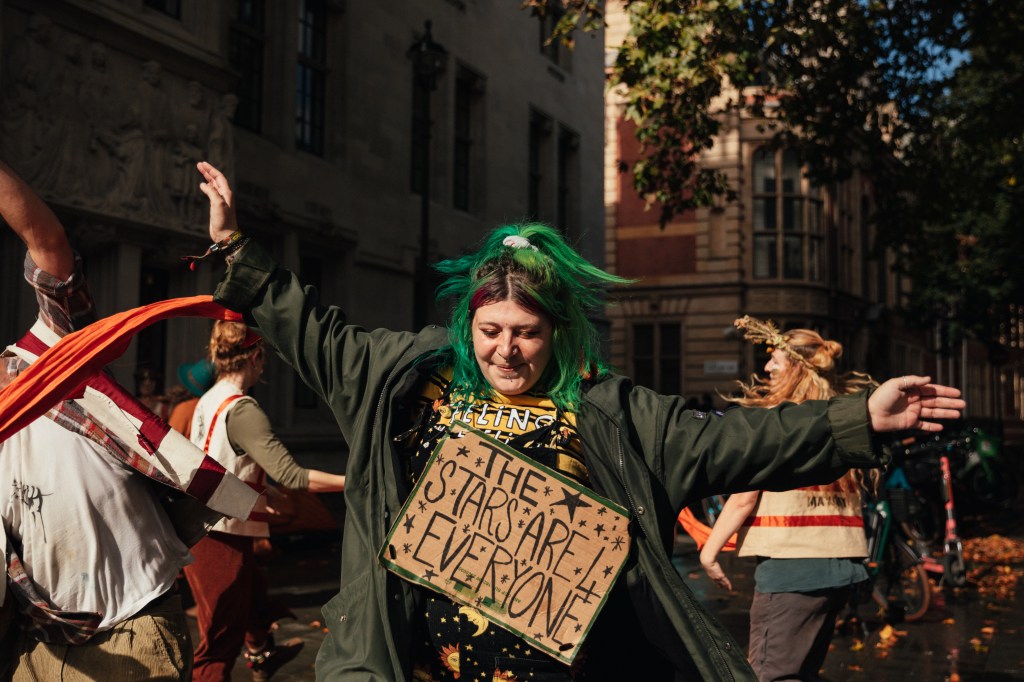
The stars are for everyone. Credit: Emma Stoner
We’re living at a time of crisis, not only across the natural world, but also of our experience of nature. In a recent study of nature connectedness, Britain was ranked lowest out of all countries surveyed. Our biodiversity didn’t fare much better. If we are to solve these interrelated crises, we must find ways to enable a closer relationship with the natural world.
Sleeping under the night sky, and having the right to belong in a landscape after the sun has set is one of those ways; yet, it is confined – as a right – to Dartmoor.
Whether we win or lose in the Supreme Court, the real test now is how resolute we as the public are in defending and extending our rights of access to nature. Right to Roam are campaigning for new legislation to unlock the countryside. We will continue to call for extensions to public access in England (with BMC leading efforts in Wales) – including a right to sleep under the stars – so that more people can experience rights like those enjoyed in Scotland.
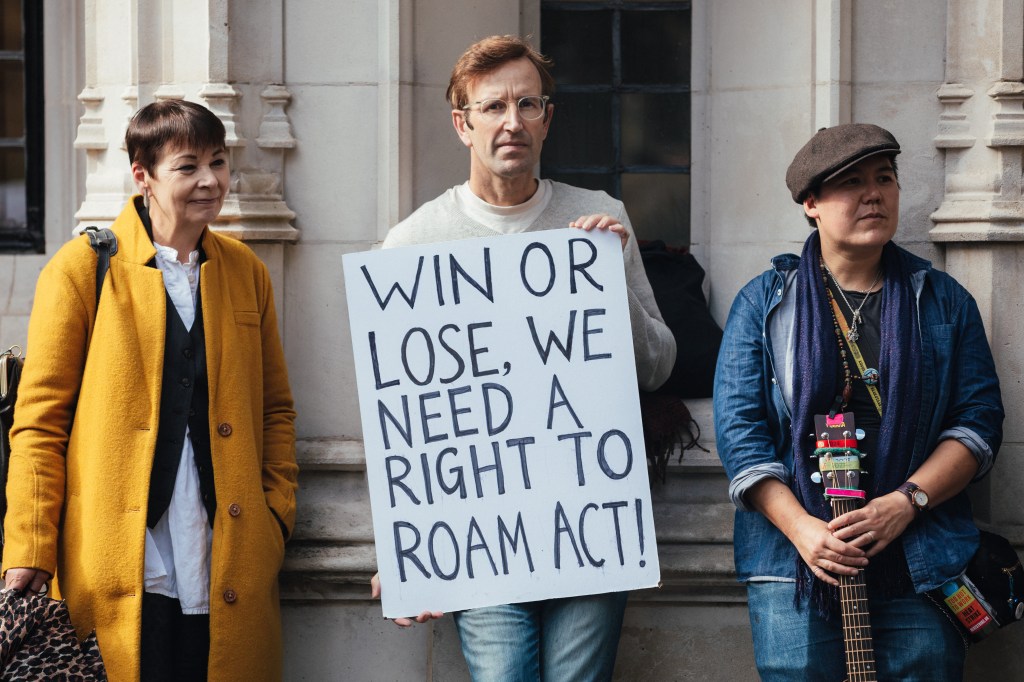
Scotland’s Right to Roam model offers deep connection with the local land. Credit: Emma Stoner
While we fight for our right to wild camp on a fraction of upland in southern England, the people of Scotland enjoy a right of responsible access to most land and water. While England has a presumption of exclusion, Scotland offers a presumption of access with sensible exceptions. Walking out of Rosewell with Sam underscored just how valuable this right is; what better way to teach ourselves and our loved ones how it is to responsibly be in the countryside, than to have the right to explore and connect on our own doorstep?
As Sam and I lay in our bivvy bags and looked up at the stars through a lattice of branches, he told me about favourite wild camping spots near home. Places where dog walkers seldom venture, but which remain near enough to home to nip out after a day’s work – alone, or sometimes with his family – and be back home in time for breakfast: a practice which the writer and adventurer Alastair Humphreys calls a ‘microadventure’. We finally fell asleep listening to the rustles of deer and badger and the other-worldly calls of tawny owls.
Sam has gained a deep sense of his locale, enriched by sleeping out in woods, by streams and on hilltops close to home, enlivened by the rhythms of the landscape through day and night. He’s passing this passion and knowledge on to his daughter. Isn’t it about time those of us living in England and Wales had the right to do the same?
Right to Roam are encouraging people living in England to write to their MP to call for better, fairer access to the countryside. Visit righttoroam.org.uk/write-to-your-mp to get involved, and please consider donating to the campaign.

